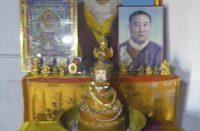
High Peaks Pure Earth presents a guest post by Jonathan Mirsky, a book review of “The Emperor Far Away: Travels at the Edge of China” by David Eimer, published in August 2014 by Bloomsbury.
“The Emperor Far Away” was featured in early August in the New York Times: http://www.nytimes.com/2014/08/04/books/the-emperor-far-away-travels-at-the-edge-of-china.html
Thank you to Jonathan Mirsky for contributing this book review. Jonathan Mirsky is a journalist who went to Tibet six times between 1982 and 1988. He is a regular contributor to New York Review of Books.
“The Emperor Far Away: Travels at the Edge of China”
By David Eimer
Most foreigners in China – summed up too bluntly as a “cruel country” [p.88] by David Eimer, rather than “cruel regime “– are content to stay in one modern eastern city or travel between three or four of them, with side trips to the Great Wall or the Ming Tombs. But there have always been some, like Sven Hedin and Peter Fleming or, more recently, Peter Hopkirk – who has just died – and Colin Thubron, who have travelled to the edges of what Beijing calls China but is really home to scores of non-Hans. They speak their own languages, eat their own food, when not forbidden they worship their own gods, and while generally they dislike the Hans, others – and Mr. Eimer describes this well – pretend not to mind Hans at all while discreetly remaining Other.
Beijing contends that all 1.3 billion inhabitants are part of one big family, as Mr Eimer says, and makes sure representatives of the 100 million Minorities march in their traditional clothing on National Day; during the Beijing Olympics, to ensure no awkward scenes, while all the dancers representing the Fifty Five National Minorities were dressed in Tibetan, Uighur, Miao, Dai etc costumes – they were actually Hans purporting to come from the outer regions. Most Hans are baffled, resentful, and transfixed by the Nationalities. They can’t understand why they continue to be so different and are annoyed that they aren’t grateful to receive the civilizing advantages of Han rule and control. But many Hans, Mr Eimer shows, are also fascinated by non-Han mysterious otherness – Tibet, for example, is now a fashionable destination for younger travellers – and are attracted by what many Hans believe to be the Minorities’ sexiness, even their promiscuity.
David Eimer wanted to visit these non-Han regions and in a brief but tough trip in 1988 he saw some of them. In 2005 he returned to China, remaining there as a journalist until 2012. He used his time to travel, indeed endure, a mighty trip including Xinjiang, Tibet, the North Korean and Russian borders in the West and North, and Yunnan and the Burmese border regions in the south.
During his second trip he spoke some Chinese (he imagines Mandarin is a written as well as a spoken language) which is handy in the Minority regions as their second language. He noticed in a somewhat wide-eyed way how different were the people he travelled and occasionally lived among, smoked various substances, and – he feels we should know – slept with a Chinese woman he encountered along the way.
Because High Peaks Pure Earth focuses on Tibet I will confine myself to what Mr. Eimer found in the Tibetan regions, although some of his most interesting moments occurred elsewhere, such as his moving account of how young women along the Burmese-Chinese border are lured into China, (rather like Bulgarian and Rumanian women enticed into Britain) as sex slaves or wives. Some of his judgements will surprise Tibetans. Mr Eimer suggests that the late 10th Panchen Lama is “probably more deserving than the Dalai Lama of veneration because of his courage in challenging the Chinese and the suffering it caused him.”[p. 129] The Panchen Lama was a genuine hero, but not only the present, 14th, Dalai Lama but all Dalai Lamas are venerated as Tibet’s religious leaders, and the 14th is especially honoured because until recently he was Tibet’s political leader as well.
If you know nothing of China’s border regions, you can start here and move on to some of the more substantial books either mentioned by Mr Eimer, or listed in his bibliography, such as the one edited by Pamela Crossley et al or by Peter Hopkirk and Colin Thubron.
Mr Eimer admits that, like many Chinese, he went to Tibet hoping for something spiritual and uncomplicated. He soon found it wasn’t and he doesn’t hide the fact that he was glad to leave, if for no other reason than his apprehension that Tibetans and Hans were ever ready to kill each other. He also hated Tibetan food, and was disgusted by the local toilets. I feel that although this is a travel book Mr Eimer is hardly what used to be called a good traveller.
He briefly mentions the Tibetan uprising of the mid-Fifties that resulted in the flight of the Dalai Lama – one of whose brothers was deeply involved – in 1959. There are very good accounts of this important event elsewhere. It was also a CIA operation, mentioned by Mr Eimer only later in the book, and secretly encouraged by India. There is an important and accurate paragraph or two by Mr Eimer in which he observes that, ”It is the monks, the people whose immersion in Buddhism is supposed to have instilled a benign acceptance of fate, who remain the most willing to protest what is happening in Tibet.”[p. 116] It is they who are the chief self-immolators usually, he rightly says, “in eastern Tibet and the western Sichuan borderlands – the traditional centres of Tibetans resistance.”[p. 116]
Mr Eimer decided to get away from Lhasa, where he felt unwelcomed by both Tibetans and Hans, and make a pilgrimage to the sacred Mount Kailash. Before his agonizing trek around the mountain’s pilgrim’s path, plagued as usual by food and the toilets, what he saw during his long car ride there seems to have been of little interest to him apart from the need to avoid the Armed Police, the Wujing (he mis-spells as Wu Jing). He left the sacred mountain with this breathless conclusion, which in my judgement wholly underestimates how different communist rule is from what came before: ”Kailash stands as an unchanging testament not only to the power of belief but to its supremacy over the diktats of the CCP [Chinese Communist Party] – just another of the dynasties that have risen and fallen throughout Chinese history. “[p. 150] Considering that not a single world leader will meet the Dalai Lama on equal and open terms, that seems hippy-drivel. Indeed, the assertion is undermined by this sentence of David Eimer’s, which to me, after my own trips to Tibet between 1981 and 1988, when things were bad but not as awful as now, seems only too right: “Now what little dialogue that takes place in Tibet between the locals and the Han is being replaced by death.”[p.117]
“The Emperor Far Away: Travels at the Edge of China”
By David Eimer
Buy the book on Amazon here: http://amzn.to/WfoHux






Follow Us!